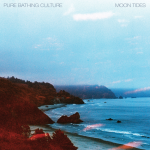
Pure Bathing Culture Moon Tides
(Memphis Industries)
Controller of emotions, influencer of the tides and the menstrual cycle, the moon is a symbol in the night sky full of mythical constellations used by ship navigators for centuries. In literature and in music, the moon appears everywhere; one of my favorite lines about it comes from Samuel Beckett: "Let me hear nothing of the moon, in my night there is no moon, and if it happens that I speak of the stars it is by mistake." It's ubiquitousness is also in music, ranging over many styles, from the jazz standard "How High The Moon", to the rock-stomper of Creedence Clearwater Revival's "Bad Moon Rising," Pink Floyd's album The Dark Side Of The Moon, Neil Young's Harvest Moon, Nick Drake's Pink Moon, Ozzy's Bark At The Moon, and now to Pure Bathing Culture's Moon Tides, the debut album of the Portland, Oregon duo Sarah Versprille and Daniel Hindman, out now on Memphis Industries.
We've seen these female singer/male guitarist combos before, most successfully in the work of Beach House, the Baltimore duo that created a number of albums that gracefully complimented the lives of all the 20-somethings experiencing new life - either from being in college or just graduating college - as part of the worldwide shift from suburbs to cities. Beach House captured the perfect ups-and-downs that accompany experiences, and Pure Bathing Culture is trying to do the same thing, as different musicians with only a slightly different interest in sound. The first track, and first single off the record, Pendulum, starts things off right, with a uplifting chorus combined with sea-salty electric guitar arpeggios that call forth for the melody, and enough reverb to create a beautiful, drippy, unstable and emotional atmosphere. The result is a youthful song that reminds me of antique shopping, tight pants, and vintage clothing store finds; it's the kind of song that makes little objects sing a tinkling sound. There's nothing experimental here, either in timbre or structure. This is pure dream pop, creamy like milk, multicolored like the inside of a Goodwill, and soft like hair just washed with shampoo in a hot shower. Since, like many music lovers, I experience synesthesia, this is the music of an off-white, like a cotton t-shirt white, and a blue of none other than the ocean in a dusk of pale beer and light snacks. This is the feeling of everything being just right for a brief moment, despite the psychological maelstroms lying ahead that accompany growing up.
There's no real drummer on Moon Tides - just a drum machine, and in a performance uploaded to YouTube, there's also an accompanying bass player that's not pictured in the band photographs, probably because he's just there for the tour, not for the recording. As musicians, Pure Bathing Culture know what they want in their music. There's a confidence to this sound, but also a deep entrenchment to it, too. The obsession over the moon in literature is a great metaphor for Pure Bathing Culture's overuse of flanger-effected guitar, melodramatic keyboard tones, and their absence of a drummer, in the sense that the moon is an overly romantic symbol, and romanticism - the furiously emotional music of Robert Schumann, or the poetry of Coleridge or Wordsworth - with its commonly incorporated objects (the moon being one of them) of birds, rivers, trees, and stars, is easily pigeonholed, easily copiable, and - with a few tweaks - easily malleable, deceptive enough to convince us that a common romantic emotion still has prevalence today when used by another creative musician or poet.
"The moonlight crumbled to degenerate forms," wrote the modernist poet Wallace Stevens, and in a way that line highlights Moon Tides biggest problem: being too easy with us in terms of musical form and lyricism. They're leading us in on a path we've all experienced before - a path of daydreaming, shopping, and relaxing; of love experienced in private moments, of secret trinkets hidden in wardrobes and dressers, of the wonders of the bedroom, of houses - those "stars in the grass" as Gaston Bachelard put it - of the unsettling mixtures of calm and turmoil, knowledge and naivete. And by the end of it all, Pure Bathing Culture sound like they don't even know that the Internet happened; Moon Tides highlights the music that the duo like to listen to, from eras long gone by, as opposed to the music that they think participates in a larger dialogue with current issues of musical aesthetics and technology. Really, the only song here worth listening to is Pendulum - the rest sound like demo-quality iterations of it. By the end of the album, the technical ability of Hindman and the lyricism of Versprille feel exhausted, gargled, and outsized by the very same influences that they try to honor in their thoroughly hackneyed attention to 80s Cocteau Twins-inspired rock.
23 August, 2013 - 04:09 — Michael Iovino